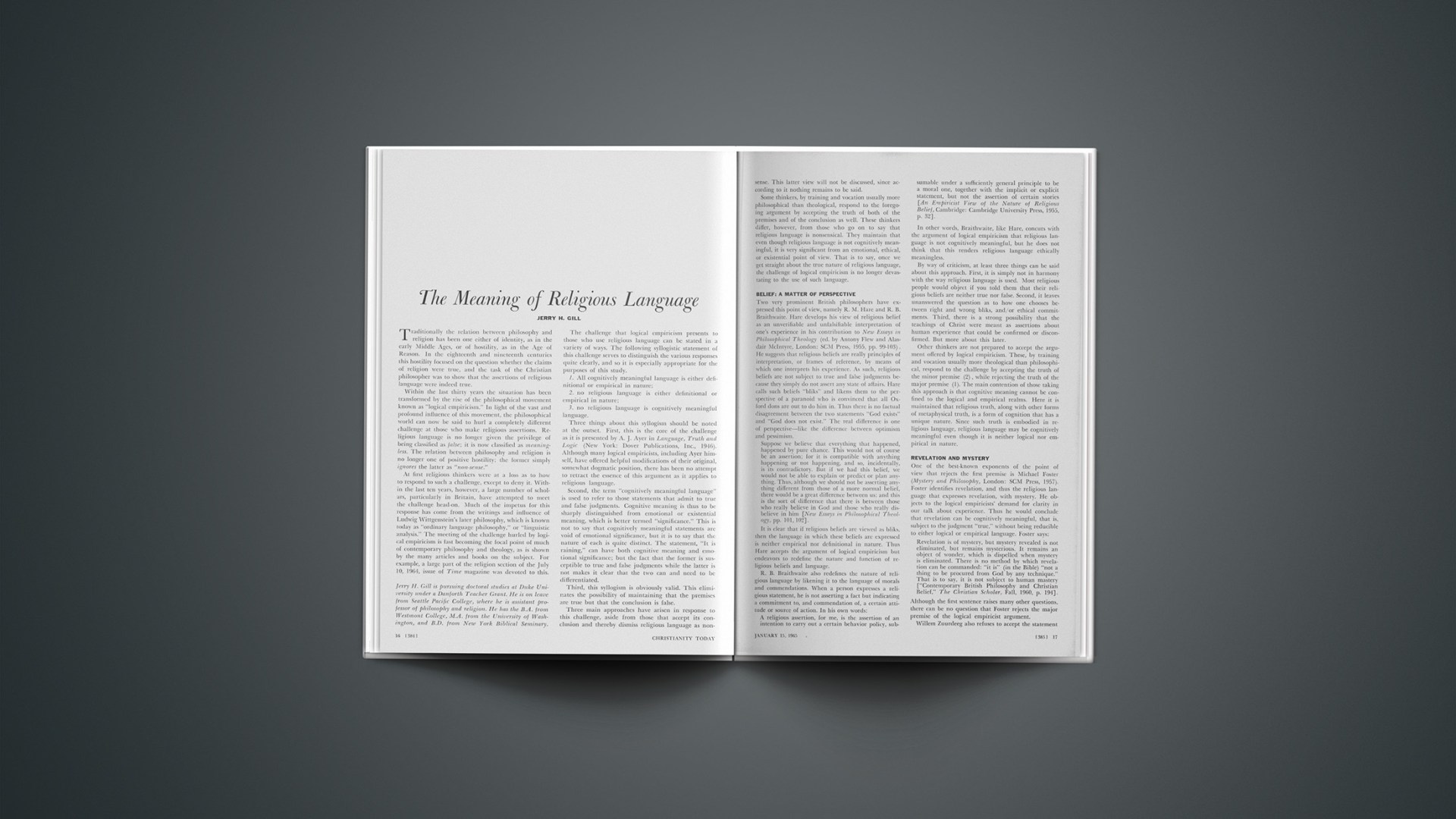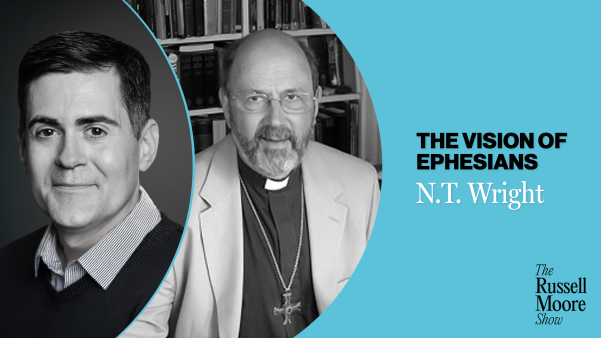Traditionally the relation between philosophy and religion has been one either of identity, as in the early Middle Ages, or of hostility, as in the Age of Reason. In the eighteenth and nineteenth centuries this hostility focused on the question whether the claims of religion were true, and the task of the Christian philosopher was to show that the assertions of religious language were indeed true.
Within the last thirty years the situation has been transformed by the rise of the philosophical movement known as “logical empiricism.” In light of the vast and profound influence of this movement, the philosophical world can now be said to hurl a completely different challenge at those who make religious assertions. Religious language is no longer given the privilege of being classified as false; it is now classified as meaningless. The relation between philosophy and religion is no longer one of positive hostility; the former simply ignores the latter as “non-sense.”
At first religious thinkers were at a loss as to how to respond to such a challenge, except to deny it. Within the last ten years, however, a large number of scholars, particularly in Britain, have attempted to meet the challenge head-on. Much of the impetus for this response has come from the writings and influence of Ludwig Wittgenstein’s later philosophy, which is known today as “ordinary language philosophy,” or “linguistic analysis.” The meeting of the challenge hurled by logical empiricism is fast becoming the focal point of much of contemporary philosophy and theology, as is shown by the many articles and books on the subject. For example, a large part of the religion section of the July 10, 1964, issue of Time magazine was devoted to this.
The challenge that logical empiricism presents to those who use religious language can be stated in a variety of ways. The following syllogistic statement of this challenge serves to distinguish the various responses quite clearly, and so it is especially appropriate for the purposes of this study.
1. All cognitively meaningful language is either definitional or empirical in nature;
2. no religious language is either definitional or empirical in nature;
3. no religious language is cognitively meaningful language.
Three things about this syllogism should be noted at the outset. First, this is the core of the challenge as it is presented by A. J. Ayer in Language, Truth and Logic (New York: Dover Publications, Inc., 1946). Although many logical empiricists, including Ayer himself, have offered helpful modifications of their original, somewhat dogmatic position, there has been no attempt to retract the essence of this argument as it applies to religious language.
Second, the term “cognitively meaningful language” is used to refer to those statements that admit to true and false judgments. Cognitive meaning is thus to be sharply distinguished from emotional or existential meaning, which is better termed “significance.” This is not to say that cognitively meaningful statements are void of emotional significance, but it is to say that the nature of each is quite distinct. The statement, “It is raining,” can have both cognitive meaning and emotional significance; but the fact that the former is susceptible to true and false judgments while the latter is not makes it clear that the two can and need to be differentiated.
Third, this syllogism is obviously valid. This eliminates the possibility of maintaining that the premises are true but that the conclusion is false.
Three main approaches have arisen in response to this challenge, aside from those that accept its conclusion and thereby dismiss religious language as nonsense. This latter view will not be discussed, since according to it nothing remains to be said.
Some thinkers, by training and vocation usually more philosophical than theological, respond to the foregoing argument by accepting the truth of both of the premises and of the conclusion as well. These thinkers differ, however, from those who go on to say that religious language is nonsensical. They maintain that even though religious language is not cognitively meaningful, it is very significant from an emotional, ethical, or existential point of view. That is to say, once we get straight about the true nature of religious language, the challenge of logical empiricism is no longer devastating to the use of such language.
Belief: A Matter Of Perspective
Two very prominent British philosophers have expressed this point of view, namely R. M. Hare and R. B. Braithwaite. Hare develops his view of religious belief as an unverifiable and unfalsifiable interpretation of one’s experience in his contribution to New Essays in Philosophical Theology (ed. by Antony Flew and Alasdair McIntyre, London: SCM Press, 1955, pp. 99–103). He suggests that religious beliefs are really principles of interpretation, or frames of reference, by means of which one interprets his experience. As such, religious beliefs are not subject to true and false judgments because they simply do not assert any’ state of affairs. Hare calls such beliefs “bliks” and likens them to the perspective of a paranoid who is convinced that all Oxford dons are out to do him in. Thus there is no factual disagreement between the two statements “God exists” and “God does not exist.” The real difference is one of perspective—like the difference between optimism and pessimism.
Suppose we believe that everything that happened, happened by pure chance. This would not of course be an assertion; for it is compatible with anything happening or not happening, and so, incidentally, is its contradictory. But if we had this belief, we would not be able to explain or predict or plan anything. Thus, although we should not be asserting anything different from those of a more normal belief, there would be a great difference between us; and this is the sort of difference that there is between those who really believe in God and those who really disbelieve in him [New Essays in Philosophical Theology, pp. 101, 102].
It is clear that if religious beliefs are viewed as bliks, then the language in which these beliefs are expressed is neither empirical nor definitional in nature. Thus Hare accepts the argument of logical empiricism but endeavors to redefine the nature and function of religious beliefs and language.
R. B. Braithwaite also redefines the nature of religious language by likening it to the language of morals and commendations. When a person expresses a religious statement, he is not asserting a fact but indicating a commitment to, and commendation of, a certain attitude or source of action. In his own words:
A religious assertion, for me, is the assertion of an intention to carry out a certain behavior policy, subsumable under a sufficiently general principle to be a moral one, together with the implicit or explicit statement, but not the assertion of certain stories [An Empiricist View of the Nature of Religious Belief, Cambridge: Cambridge University Press, 1955, p. 32].
In other words, Braithwaite, like Hare, concurs with the argument of logical empiricism that religious language is not cognitively meaningful, but he does not think that this renders religious language ethically meaningless.
By way of criticism, at least three things can be said about this approach. First, it is simply not in harmony with the way religious language is used. Most religious people would object if you told them that their religious beliefs are neither true nor false. Second, it leaves unanswered the question as to how one chooses between right and wrong bliks, and/or ethical commitments. Third, there is a strong possibility that the teachings of Christ were meant as assertions about human experience that could be confirmed or disconfirmed. But more about this later.
Other thinkers are not prepared to accept the argument offered by logical empiricism. These, by training and vocation usually more theological than philosophical, respond to the challenge by accepting the truth of the minor premise (2), while rejecting the truth of the major premise (1). The main contention of those taking this approach is that cognitive meaning cannot be confined to the logical and empirical realms. Here it is maintained that religious truth, along with other forms of metaphysical truth, is a form of cognition that has a unique nature. Since such truth is embodied in religious language, religious language may be cognitively meaningful even though it is neither logical nor empirical in nature.
Revelation And Mystery
One of the best-known exponents of the point of view that rejects the first premise is Michael Foster (Mystery and Philosophy, London: SCM Press, 1957). Foster identifies revelation, and thus the religious language that expresses revelation, with mystery. He objects to the logical empiricists’ demand for clarity in our talk about experience. Thus he would conclude that revelation can be cognitively meaningful, that is, subject to the judgment “true,” without being reducible to either logical or empirical language. Foster says:
Revelation is of mystery, but mystery revealed is not eliminated, but remains mysterious. It remains an object of wonder, which is dispelled when mystery is eliminated. There is no method by which revelation can be commanded: “it is” (in the Bible) “not a thing to be procured from God by any technique.” That is to say, it is not subject to human mastery [“Contemporary British Philosophy and Christian Belief,” The Christian Scholar, Fall, 1960, p. 194].
Although the first sentence raises many other questions, there can be no question that Foster rejects the major premise of the logical empiricist argument.
Willem Zuurdeeg also refuses to accept the statement that all cognitively meaningful statements are either logical or empirical in nature (An Analytical Philosophy of Religion, Nashville: Abingdon, 1961). He maintains that religious truth, and thus religious language, is unique in that it is not limited to propositional assertions. Moreover, it cannot be analyzed or justified. Nevertheless, Zuurdeeg wants to maintain that such statements are still meaningful and true.
I must protest vehemently against the notion that language of Christian faith consists of propositions which can be analyzed by means of logic. If it does not make sense to a philosopher to attempt a logical analysis of persons, how much sense will it make to a theologian to try to do so with the Lord God? Exactly in the way that man is man-who-speaks, so God is God-who-speaks. Can we offer a logical analysis of the Creator of Heaven and Earth? Shall we discard the doctrine of the Trinity simply because the language in which it is expressed is logically inconsistent [“Implications of Analytical Philosophy for Theology,” The Journal of Bible and Religion, July, 1961, p. 209].
Despite the fact that the approach represented here by Foster and Zuurdeeg argues on the side of angels, there are several reasons for rejecting it as inadequate. First, it runs the risk of rendering religious language so distinct from all other language that it becomes irrelevant. Second, no extra-logical criteria are offered by means of which one can even decipher the content of religious statements, let alone distinguish between those that are meaningful and those that are not. Third, there is no contesting the fact that reality and experience cannot be completely re-presented in language, but this obvious fact should not be used to license sloppy talk. Fourth, as John Locke clearly saw, whether or not revelation is true is not the real problem; rather, the problem is which statements are to be taken as revelation. The best way to honor revelation and mystery is to apply rigid standards so as to be able to distinguish non-sense and falsehood from meaning and truth.
Relevance And Truth-Value
Another way of responding to the argument of logical empiricism is to accept the major premise (1), while rejecting the minor premise (2), and there are those thinkers who have taken up the responsibility of constructing such an approach. The main drive of this approach is to be found in the attempt to relate religious language to experience and thereby to establish it as cognitively meaningful. Thus, it might be called a form of Christian empiricism. The thesis of this approach is that religious language very often fulfills empirical functions and is, therefore, at those times cognitively meaningful. The main burden of such an approach is to specify the exact situations in which religious language can be said to be empirical.
One of the most interesting presentations of the cognitive status of religious language is to be found in the writings of John Hick of Princeton Theological Seminary (Faith and Knowledge, Ithaca: Cornell University Press, 1957; “Theology and Verification,” Theology Today, April, 1960; and Philosophy of Religion, Englewood Cliffs: Prentice-Hall, 1963). Hick maintains that statements that make predictions about experiences taking place after death are open to verification (or at least confirmation). Such verification is termed “eschatological” by Hick, and firmly establishes the cognitive meaningfulness of this type of statement. Space will not permit a full analysis of Hick’s views at this juncture. It is sufficient to note that they are explained and presented by one who is fully aware of the challenge of logical empiricism and who endeavors to learn from its insights. Concerning the claim that there will be experiences after death, Hick says:
The logical peculiarity of the claim is that it is open to confirmation but not to refutation. There can be conclusive evidence for it if it be true, but there cannot be conclusive evidence against it if it be untrue. For if we survive bodily death we shall (presumably) know that we have survived it, but if we do not survive death we shall not know that we have not survived it. The verification situation is thus asymmetrical. However, the religious doctrine at least is open to verification and is accordingly meaningful. Its eschatological prediction assures its status as an assertion [Faith and Knowledge, p. 150].
Another recent explication of the empirical nature of religious language is found in John Hutchison’s Language and Faith (Philadelphia: Westminster, 1963). Hutchison maintains that since religion is to be understood primarily as a means of comprehensive life orientation, the language of religion is to be understood as the expression and description of various orientations to life. He contends that, like poetry, religious language is very often intended to communicate certain feelings, values, facts, and interpretations of human experience.
It should be clear that such theories or interpretations of life are subject to true and false judgments in the same sense that broad theories about the physical universe are—namely, in terms of confirmation and fruitlessness. In chapter five of his book, Hutchison uses the term “adequacy” to designate the standard by means of which life-orientational theories are to be evaluated. This adequacy implies, in addition to rational consistency and coherence, the standards of sufficient reason, simplicity, empiricism, and critical rigor (Language and Faith, pp. 129 ff.).
Other writers suggest that much of religious language functions as an empirical-theoretic model. A helpful development of religious language in terms of models can be found in the writings of Frederick Ferré (Language, Logic and God, New York: Harper & Row, 1961; and “Mapping the Logic of Models in Science and Theology,” The Christian Scholar, Spring, 1963). He outlines the functions of theological models in the following way:
Theological speech projects a model of immense responsive significance, drawn from “the facts,” as the key to its conceptual synthesis. This model, for theism, is made up of the “spiritual” characteristics of personality: will, purpose, wisdom, love, and the like. For Christianity, more specifically, the conceptual model consists in the creative, self-giving, personal love of Jesus Christ. In this model is found the only literal meaning which these terms, like “creative,” “personal,” and “love,” can have in the Christian vocabulary. All the concepts of the Christian are organized and synthesized in relation to this model. The efforts of systematic theology are bent to explicating the consistency and coherence of the synthesis built on this model of “God” as key concept. Christian preaching is devoted to pointing out the applicability of this conceptual synthesis to common experiences of life. And Christian apologetics struggles to show that the synthesis organized around this model is adequate to the unforced interpretation of all experience, including suffering and evil [Language, Logic and God, p. 164].
Ferré goes on to point out that since the language, thoughts, and actions that are based on a given conceptual model can be evaluated in terms of their coherence and adequacy in dealing with experience, it is possible to speak of one model as being more appropriate, or more fruitful, than others (ibid., p. 165). This sort of evaluation implies cognitive meaning, since although the criteria and results of such evaluation are difficult to determine, the models are, in theory, confirmable or disconfirmable.
The Disclosure-Commitment Concept
The one writer who perhaps has done more than any other to develop an explication of the complex elements involved in this experiential use of religious language is Ian T. Ramsey of Oriel College, Oxford (Religious Language, New York: Macmillan, 1957; and “Contemporary Empiricism,” The Christian Scholar, Fall, 1960). Ramsey develops the concept of “discernment” or “disclosure” to describe the nature of the situations that provide the experimental basis for religious language. He maintains that a religious disclosure gives rise to a “commitment” to what is disclosed, and that this disclosure-commitment situation in turn gives rise to what we have termed experiential-religious language. It is maintained that such disclosure-commitment situations are anchored in experience and in this sense can be said to be empirical.
One group of examples Ramsey uses to illustrate what he terms “discernment” or “disclosure” is composed of situations in which, because of a unique set of personal experiences, the significance is always greater than what can be expressed in terms of physical description alone. In a way he is saying that because of the facts of highly personal experience, seemingly ordinary, public situations are “seen,” or discerned, in a new light. In other words, one’s personal, mental experience often acts as a catalyst, or a category, which fills a situation with more significance than just a description of the objective facts would provide. Thus such situations are more than empirical in the narrow or sensory sense of that word, but are still empirical (experiential) in the broad sense.
Ramsey maintains that the experiential-religious language that arises out of religious experiences is both similar to and different from ordinary language. It is different in that it is not about objects, and thus follows a logic that is a bit “odd” at key points, e.g., in the use of the term “God.” Such talk is similar, however, to that type of ordinary language which pertains to personal experience. Thus Ramsey maintains that the term “God” is no more odd than the term “I” as employed in such personal talk as, for instance, the discussion of one’s motives.
So our conclusion is that for the religious man “God” is a key word, an irreducible posit, an ultimate of explanation expressive of the kind of commitment he professes. It is to be talked about in terms of the object-language over which it presides, but only when this object-language is qualified; in which case this qualified object-language becomes also currency for that odd discernment with which religious commitment, when it is not bigotry or fanaticism, will necessarily be associated.
Meanwhile, as a corollary, we can note that to understand religious language or theology we must first evoke the odd kind of situation to which I have given various parallels above. This is plainly a sine qua non for any religious apologetic.
At the same time we must train ourselves to have a nose for odd language, for “logical impropriety,” and it is possible to do this by concerning ourselves with other examples of odd language which may not in the first instance be religious [Religious Language, p. 47].
The main point that Ramsey makes, in good Wittgensteinian fashion, is that just the fact that talk which arises from personal, religious discernment is odd with respect to the language of physics, is no reason to conclude that it does not have an adequate logic that is similar to other forms of ordinary language. Thus this experiential-religious language can be cognitive to the extent that (1) it is anchored in experience and (2) it has an established use by means of which appropriate and inappropriate talk can be distinguished.
A ‘Qualified-Model’
In discussing the attempts to describe God, Ramsey develops the concept of a “qualified-model” to explain the logic of such phrases as “infinitely good” and “first cause.” In such phrases the terms “good” and “cause” are models in the sense that they are taken from experience, while the terms “infinite” and “first” are qualifiers that indicate the logical oddness of this particular use of the model terms. Thus to say that God is “infinitely good” is to say that he is similar to the moral quality of goodness we experience in everyday life, and that his goodness has a different quality than human goodness.
Now it would seem that this analysis suggests a way of dealing with religious language that conforms both to the way religious language is used and to the criteria of legitimate theoretic language. To talk of God as a “heavenly father” or “divine creator” is to speak analogically and hypothetically. That is, one is endeavoring to suggest a qualified similarity between a concrete aspect of past and present experience, and future experience. This qualified similarity must be taken as a tentative hypothesis, or conceptual model, which may be confirmed or disconfirmed on the basis of its fruitfulness in enabling a person (and perhaps a society) to appreciate, understand, and predict experience. (Ramsey suggests the concept of “empirical fit” as a criterion of confirmation in his new book, Models and Mystery [New York: Oxford, 1964].) Obviously, if such models tend to be disconfirmed, then they should be withdrawn, and vice versa. In any case, they have an experiental, albeit a theoretic, nature, and thus it can be said that they involve cognitive meaning.
This, then, is a sketch of the challenge and main responses concerning the meaning of religious language. Obviously, this writer is more impressed with the third, or empirical, response to the challenge because it preserves both the relevance and the truth-value of religious assertions. The other two responses are weak at these two points. All of the responses, however, are only in their beginning stages, and a great deal of work remains to be done. Further explorations may reveal more fruitful approaches.










